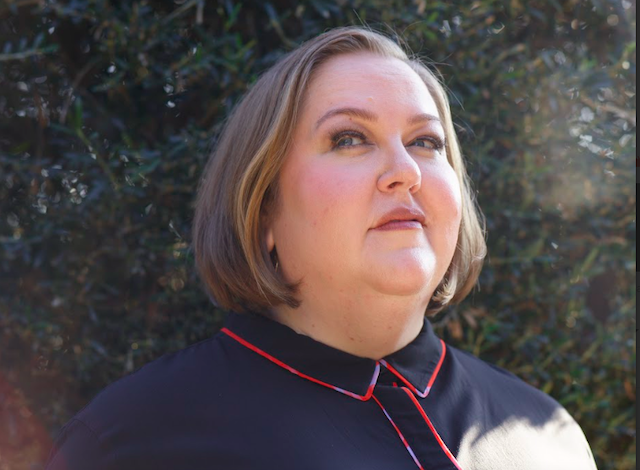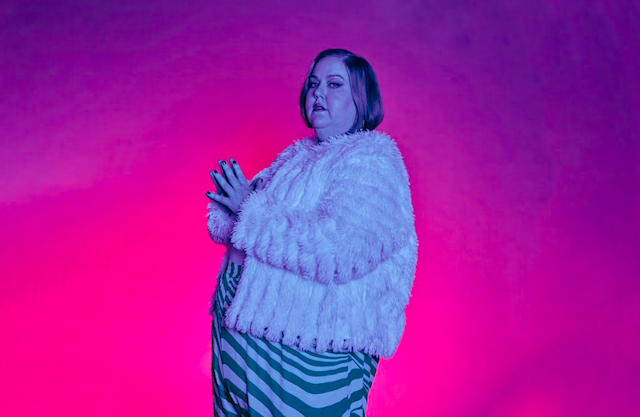
BY WINNIE McCROY | The 2023 Tribeca Film Festival includes, among its documentary offerings, filmmaker Jeanie Finlay’s Your Fat Friend, a look at the formerly anonymous blogger Aubrey Gordon. Since February 2016, the 350 lb. writer has discussed the realities of life as a fat person in a world built for the thin.
“Just say fat,” demands Gordon to a crowd at Portland’s legendary Powell’s Books, reeling off a list of unacceptable euphemisms—everything from fluffy to morbidly obese. But don’t rush to correct how people describe themselves, she says. And while self-love is great, it’s a crazy idea to think you can love yourself out of oppression.

Such were the pearls of wisdom dispersed by Gordon after five years of writing blogs, essays, and finally her book, What We Don’t Talk About When We Talk About Fat. Her posts on @yrfatfriend are derided by haters who call her names, send her death threats, and dox her. But her bravery is embraced by her followers, who number upwards of 100,000.
Gordon challenges people’s assumptions about being overweight by writing about the reality of being a fat person. At size 26, she is fat enough that even some stores for fat people don’t carry her size.
“Every discussion about bodies is about how to escape the horrible fate of looking like me,” she says, adding that you should love your body, and let it grow like a wilderness.
Fat is seen as unhealthy, and it’s our duty to be as healthy as possible. Yet despite all the scientific evidence to the contrary, people assume being fat is both extremely unhealthy and a sign of personal weakness, and they hate fat people for it.
The realities of life are also a challenge. Physical spaces like airplane seats and restaurant booths are not big enough. Fat people walk down the aisle of bus, and see every empty seat fill up with a bag, because nobody wants to sit next to them. Even doctors are reluctant to treat fat people. The diagnostic machines are too small, the medications are not tested on the fat, and they can’t leave without that obligatory weight loss talk.
Despite her father being a pilot, Gordon’s biggest fear was flying—or more precisely, practicing ways she can sit in a tiny airplane seat that make no physical claims for space, fearing for weeks before a flight that the airline will boot her off because of her size, being watched and judged harshly for trying to fit into a space made for a much smaller person, because, “Fat people shown as loud, obnoxious travelers getting Cheetos dust everywhere.”

Gordon realizes these beliefs are based on false judgments, but still make up “the water we all swim in every day.” And having run nonprofits to help gay and transgender youth, she knows that one person can make a difference. She knows people can change the way they treat the fat people in their lives, and she’s here to give some tips.
First, realize that even with good intentions, you can still do harm. Enter Gordon’s parents, Pam and Rusty. Her mom, a former Pan Am stewardess, was a longtime practitioner of Weight Watchers, did the Atkins diet, and even took fen-phen (which was pulled off the market soon after). As a child, Gordon learned more from how her mom looked at herself than how she looked at her, coming to realize, “If you feel like that about your body, how am I supposed to feel about mine?”
Pam said Rusty made their daughter’s weight gain her responsibility, so she went through motions she says she didn’t really want to. Pam’s regrets included wishing she had stood up to Rusty, or even included Aubrey in those discussions. She asks herself, “Why didn’t I do things differently?” adding, “You do the best you can with what you have at the moment.”
So young Aubrey was sent to fat day camps and kids weight loss programs by age 11. She was counting calories, keeping a food journal, fearing food, and resenting it. As a kid, she tried for years to lose weight, with no lasting results. As an adult, she talked to countless people about all kinds of diets that didn’t work. Even though those people had tried for years to lose weight with no lasting results, they all still blamed themselves. At first, she was exasperated by it, but then it just made her mad.
The film shows her shopping at seafood counter. Gordon says she now eats healthy but used to starve herself and still be fat. At Thanksgiving, she contends with comments about setting back the scale 15 lbs., and quips like, “A moment on the lips, a lifetime on the hips.”
“Before you comment on how much you’ve eaten, the weight of your regret, yours fears for the body you might grow into, stay silent for a moment. Ask why you wanted to say it,” says Gordon. “Ask who it would benefit. Remember that we’re here to look out for one another. We’re here to care for each other, as imperfect as that love may be. Model the love you wish you saw around you. Model the love you need.”
After her publisher accepts her book pitch, she tackles issues like this, as well as the $4.5T Global Wellness industry, which she calls “a Jedi mind trick for dieting.” She abhors how they target teens, who are much more likely to develop eating disorders if they begin dieting under the age of 18. Instead of pointing out whether people are fat or thin, she advises, take a tip from pop star Adele, who lost a lot of weight.
“She didn’t say anything about it, so neither should we,” said Gordon, who receives a supportive note from Adele. Waves of praise were followed by negative attention—not only comments about her body, but death threats. She began to think of herself as a literal target.
But with the help of a new deadbolt and the comfort of her little dog, the 37-year-old finished her book, and began touring it city to city, fear of flight be damned. Pam and Rusty joined her for a sold-out crowd at Powell’s, both proclaiming to be “amazed” at the long line of fans waiting to tell her how much her book meant to them. Frankly, it’s a bit offensive to Gordon to think, “Only 50 people would come,” as her dad remarks. But she loves her parents, remarking that most fat people don’t have anyone at all to cheer them on.
“Fat people have spent our entire fucking lives changing to fit the world around us,” Gordon tells the crowd. “You could be the one person that we don’t have to change in order to be with.”
Directed by Jeanie Finlay. Runtime: 96 minutes. To view its Tribeca Film Festival page, click here. To view it at home, click here. Remaining screenings as of this review’s publication: Fri., June 16, at Village East by Angelika (181-189 Second Ave.) and Rush tickets only for Sun., June 18 at Village East by Angelika. Rush will be offered when advanced tickets for a screening or event are no longer available at venues other than Beacon Theatre. The Rush system functions as a standby line that will form at the venue approximately one hour prior to scheduled start time. Admittance is based on availability and will begin roughly 10 minutes prior to program start time. Rush Tickets are the same price as advance tickets and are payable upon entry.
–END–
Chelsea Community News is an independent, hyperlocal news, arts, events, info, and opinion website made possible with the help of our awesome advertisers and the support of our readers. Our Promise: Never a paywall, no pop-up ads, all content is FREE. With that in mind, if circumstances allow, please consider taking part in our GoFundMe campaign (click here). To make a direct donation, give feedback, send a Letter to the Editor, or contact our founder/editor, email Scott Stiffler via scott@chelseacommunitynews.com.
To join our subscriber list, click here. It’s a free service provding regular (weekly, at least) Enewsletters containing links to recently published content. Subscribers also will be sent email with “Sponsored Content” in the subject line. That means it’s an exclusive message from one of our advertisers, whose support, like yours, allows us to offer all content free of charge.

You must be logged in to post a comment Login